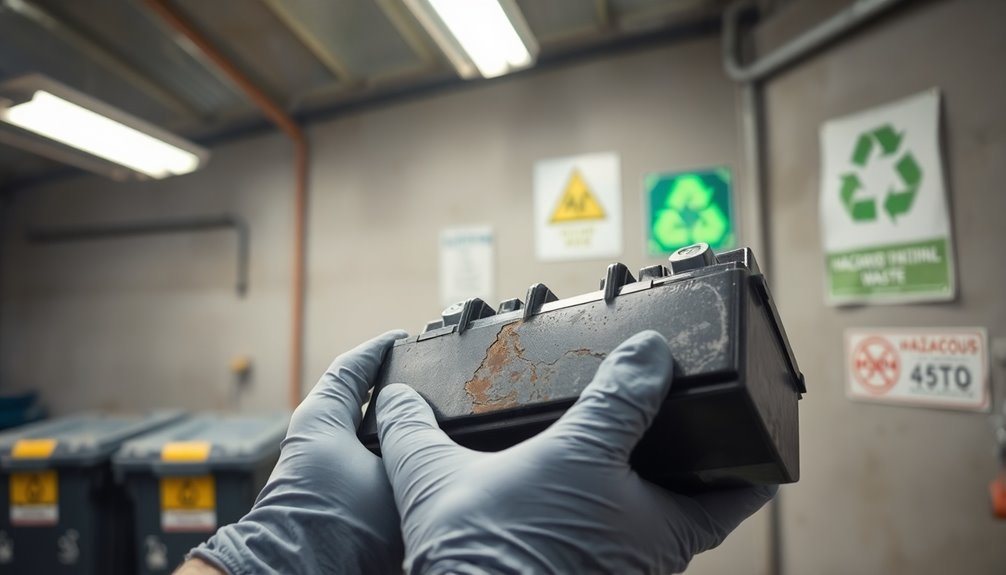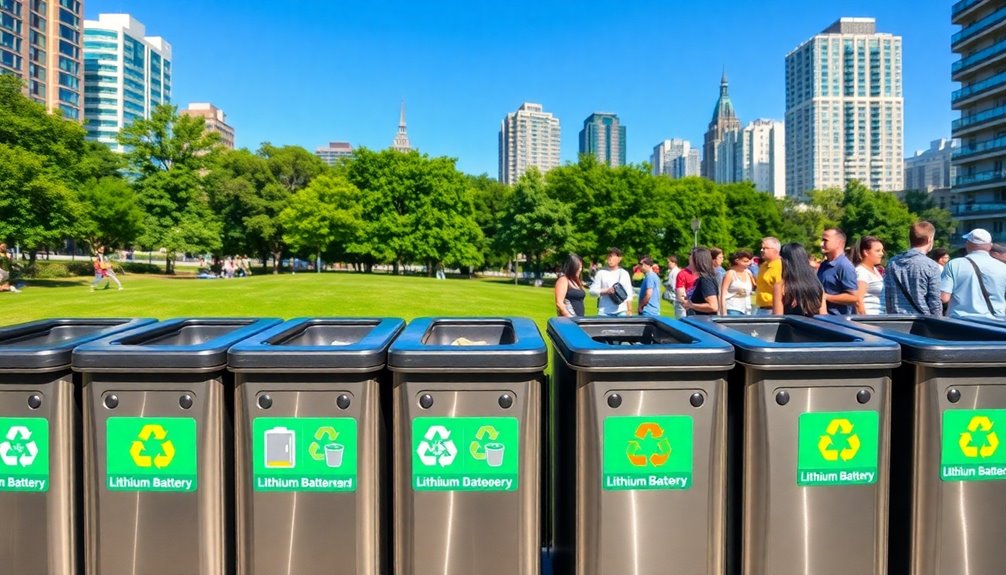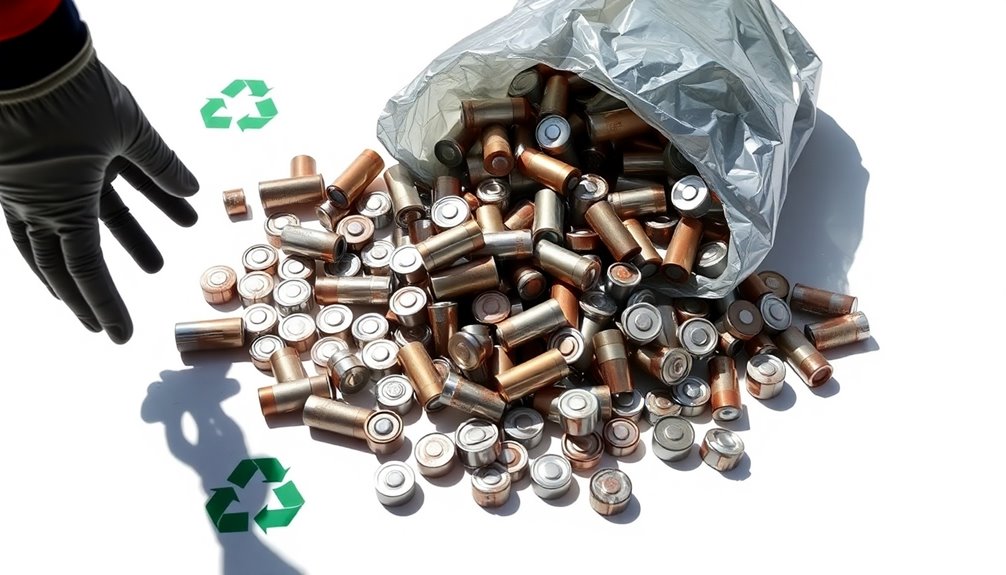You can safely dispose of dead car batteries through certified recycling programs and authorized hazardous waste facilities. Many automotive retailers offer recycling services when you buy new batteries, and local recycling centers provide designated drop-off points for hazardous waste. Community organizations also host recycling events to promote safe disposal. Remember, improper disposal can lead to severe environmental and health risks, so it's essential to follow regulations. By choosing responsible disposal methods, you help protect the planet and recover valuable materials. Discover more about your options and the benefits of recycling as you explore further.
Key Takeaways
- Automotive retailers often accept old batteries for recycling when you purchase a new one, ensuring safe disposal.
- Local recycling centers are equipped to handle hazardous materials and provide designated drop-off points for car batteries.
- Community organizations frequently organize recycling events, making it easier for residents to safely dispose of dead batteries.
- State environmental departments offer information on local recycling initiatives, ensuring compliance with regulations and guidelines.
- Battery manufacturers may provide take-back programs, allowing consumers to return old batteries safely for recycling.
Importance of Safe Disposal
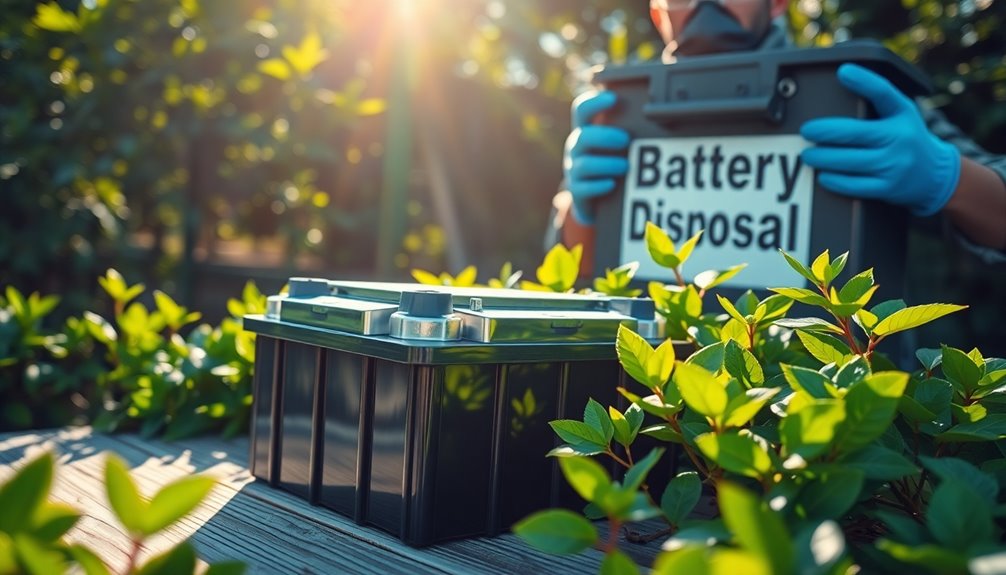
When you think about disposing of a dead car battery, it's important to recognize the potential hazards involved.
Lead acid batteries contain hazardous materials like lead and sulfuric acid, which can cause significant environmental contamination if not disposed of properly. Safe disposal practices are imperative to prevent harmful substances from leaking into the ecosystem, protecting both wildlife and human health.
Many regions have regulations prohibiting the disposal of these batteries in regular trash, making adherence to safe disposal methods essential for compliance.
Utilizing hazardous waste collection services and recycling centers not only guarantees that your battery is handled correctly but also helps recover valuable materials, promoting sustainability and reducing the environmental impact of mining new resources.
Authorized Disposal Options
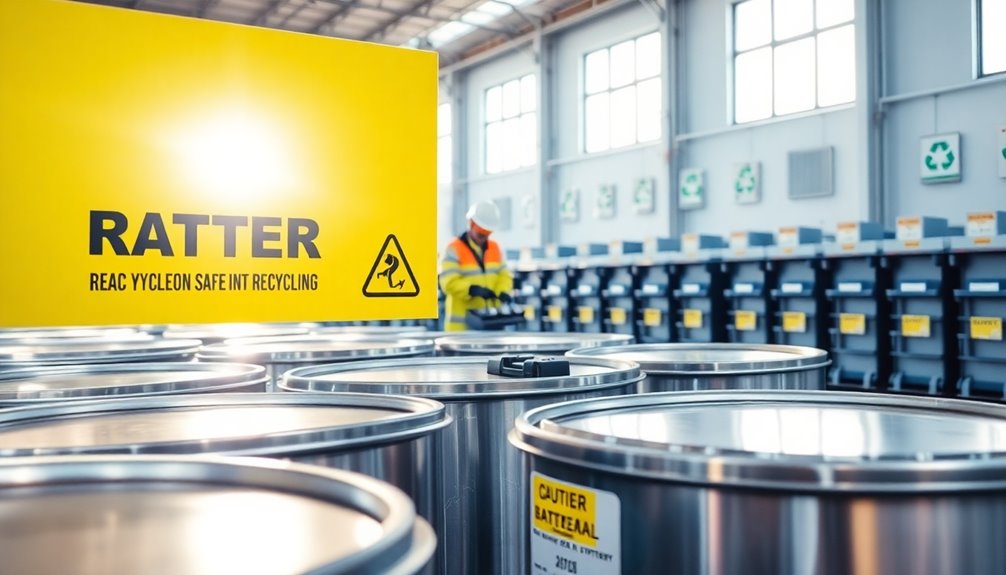
When it's time to dispose of your dead car battery, consider taking advantage of automotive retailer programs that often include recycling options.
Local recycling centers also play an essential role in ensuring safe disposal practices.
Automotive Retailer Programs
If you're looking for a responsible way to dispose of your old car battery, many automotive retailers have you covered with convenient recycling programs.
Stores like AutoZone and O'Reilly Auto Parts offer free battery recycling, allowing you to drop off your old batteries for safe disposal. When you purchase a new battery, these retailers often accept your old one, sometimes giving you a discount or credit.
Retailers such as Advance Auto Parts and Walmart have designated drop-off locations, making local recycling easy.
Some states even require auto retailers to follow hazardous waste regulations, guaranteeing compliance in battery disposal.
Local Recycling Centers
Automotive retailers provide a convenient option for battery disposal, but local recycling centers are another great resource for safely getting rid of your old car batteries.
These centers typically accept car batteries and are equipped to handle hazardous materials, ensuring proper disposal that complies with environmental regulations. Many offer free or low-cost drop-off services, promoting eco-friendly recycling practices.
You'll find that they follow strict guidelines set by state and federal laws, which means hazardous components are recycled responsibly. Additionally, some local recycling centers hold special collection events for hazardous waste, making it easier for you to participate.
To locate a nearby recycling center, use online resources like Earth911 or contact your local waste management department for assistance.
Environmental Protection Measures
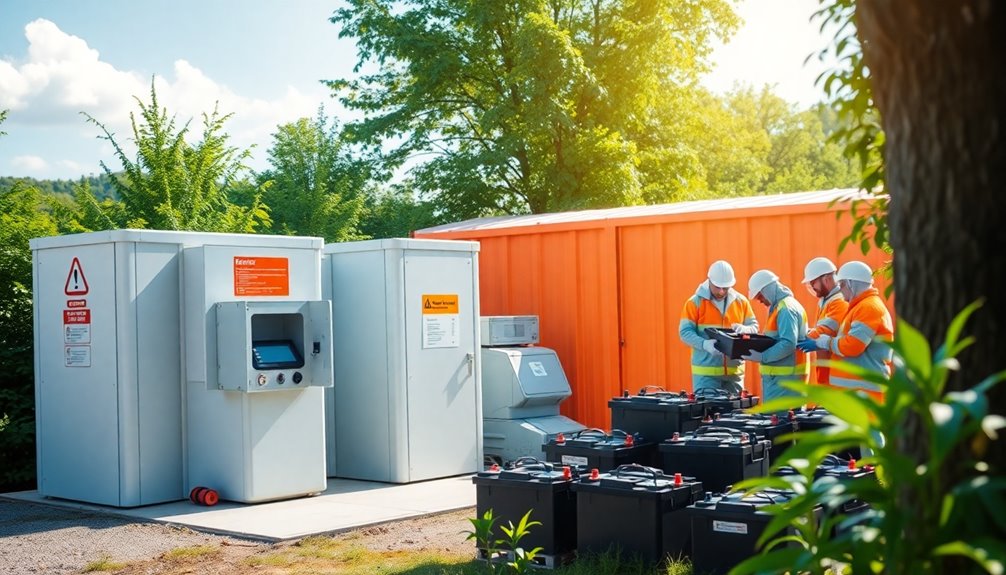
Although many people may overlook it, safe disposal of dead car batteries is essential for protecting our environment. Improper disposal can lead to toxic materials leaching into soil and water, causing significant pollution.
By participating in local recycling programs, you can contribute to resource conservation by recovering valuable materials like lead and sulfur from batteries. Environmental education initiatives play an important role in raising awareness about safe disposal practices, encouraging you to take action.
Community programs often host recycling events and provide information on disposal options, making it easier for you to engage in these efforts. Legislative measures guarantee that hazardous waste is properly managed, safeguarding public health and the ecosystem.
Your participation in responsible disposal is critical for a healthier planet.
Risks of Improper Disposal
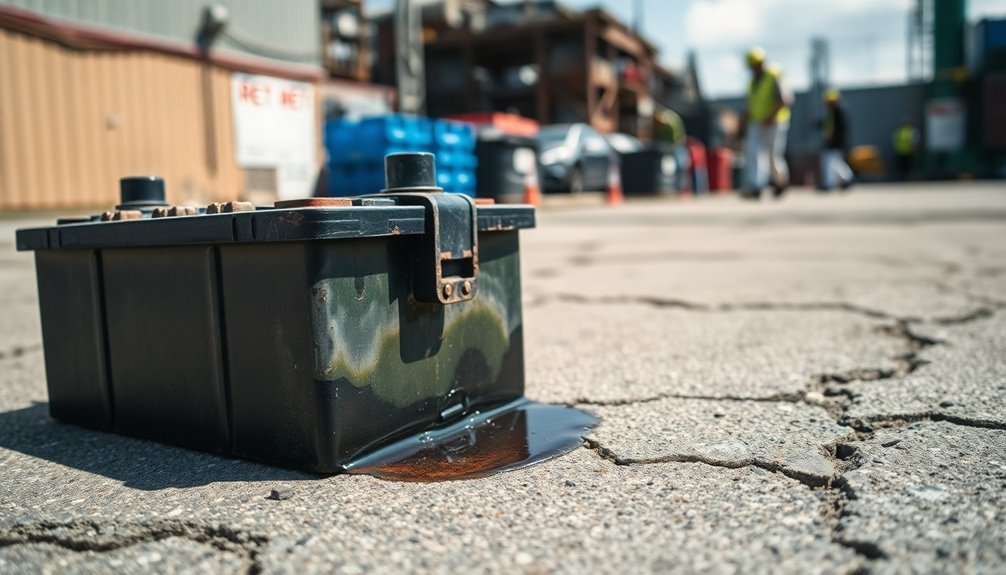
Improperly disposing of dead car batteries poses serious risks, including environmental contamination and public health hazards.
You mightn't realize that leaking toxic materials can harm soil and water, affecting both ecosystems and your health.
Plus, tossing batteries in the trash could lead to legal penalties, putting you at risk for fines or other consequences.
Environmental Contamination Risks
Dead car batteries pose a significant risk to the environment when not disposed of correctly.
When you improperly dispose of a battery, toxic substances like lead and sulfuric acid can leach into the soil and groundwater, leading to severe environmental contamination.
The EPA estimates millions of batteries are thrown away each year, contributing to widespread ecosystem degradation.
This contamination can affect local water supplies, posing health risks not just to wildlife but also to people relying on those resources.
Casual disposal methods, like tossing batteries in the trash, can also result in legal issues due to hazardous waste violations.
Protecting the environment starts with responsible disposal, so always choose safe methods for dead car batteries. Furthermore, engaging in sustainable practices can significantly reduce the overall environmental impact of waste disposal.
Legal Penalties Overview
When you dispose of a car battery improperly, you not only harm the environment but also expose yourself to serious legal consequences. Many states have strict hazardous waste regulations that prohibit the illegal disposal of lead-acid batteries.
Violating these laws can lead to hefty fines and even criminal charges.
Consider the following risks:
- Fines can reach thousands of dollars depending on your jurisdiction.
- States like Texas require recycling of lead-acid batteries and impose penalties for non-compliance.
- The Environmental Protection Agency (EPA) enforces guidelines that, if violated, could result in enforcement actions.
To avoid these legal penalties, always recycle your car batteries properly and stay informed about local regulations regarding their disposal. Additionally, improper disposal can lead to significant environmental harm, impacting ecosystems and public health.
Public Health Hazards
The risks associated with improper battery disposal extend far beyond environmental concerns; they pose significant threats to public health. When you dispose of dead car batteries incorrectly, hazardous materials like lead and sulfuric acid can leak, contaminating soil and groundwater. This exposure to toxic substances can lead to serious health issues, particularly among vulnerable populations such as children and pregnant women.
| Public Health Risks | Environmental Impact |
|---|---|
| Neurological damage | Environmental degradation |
| Respiratory problems | Bioaccumulation of toxins |
| Economic burdens | Cleanup costs |
Communities face increased public health risks and economic burdens due to cleanup costs. Consequently, it's essential to follow proper disposal practices to safeguard both public health and the environment.
Community Recycling Resources

Community recycling resources play an essential role in ensuring safe disposal of car batteries. By collaborating with local municipalities and community organizations, these resources help you find accessible options for battery recycling.
You can easily locate recycling drop-off points and participate in hazardous waste collection events. Here are some ways to get involved:
- Check with local municipalities for designated recycling centers.
- Attend community organization events focused on battery recycling.
- Use online platforms like Earth911 and Call2Recycle to find nearby drop-off locations.
These initiatives not only simplify the disposal process but also raise awareness about the importance of responsibly handling hazardous materials.
Safe Storage Practices
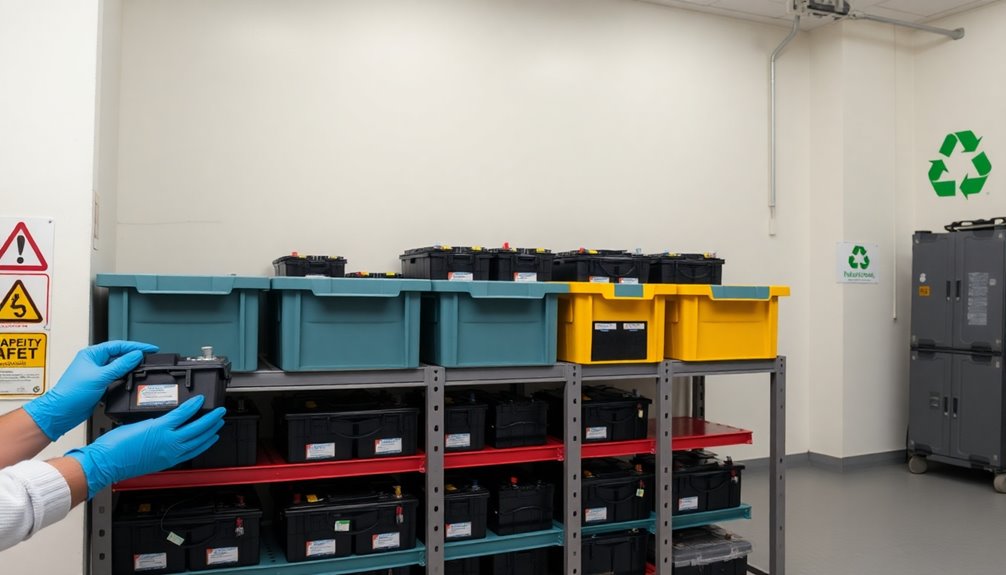
Finding community recycling resources is just the first step in responsible battery management; safe storage practices are just as important. To guarantee the safety and longevity of dead car batteries, follow these guidelines:
| Best Practices | Description |
|---|---|
| Use a secure container | Store batteries in a non-conductive container to prevent accidental contact. |
| Keep batteries lined up | Arrange them side-by-side in a cool, dry place to minimize leaks. |
| Tape ends | Cover positive and negative terminals to reduce current flow. |
| Avoid conductive materials | Keep batteries away from metallic items to prevent discharges. |
| Reuse original packaging | Utilize original packaging for safe identification and storage. |
Recycling Programs Overview
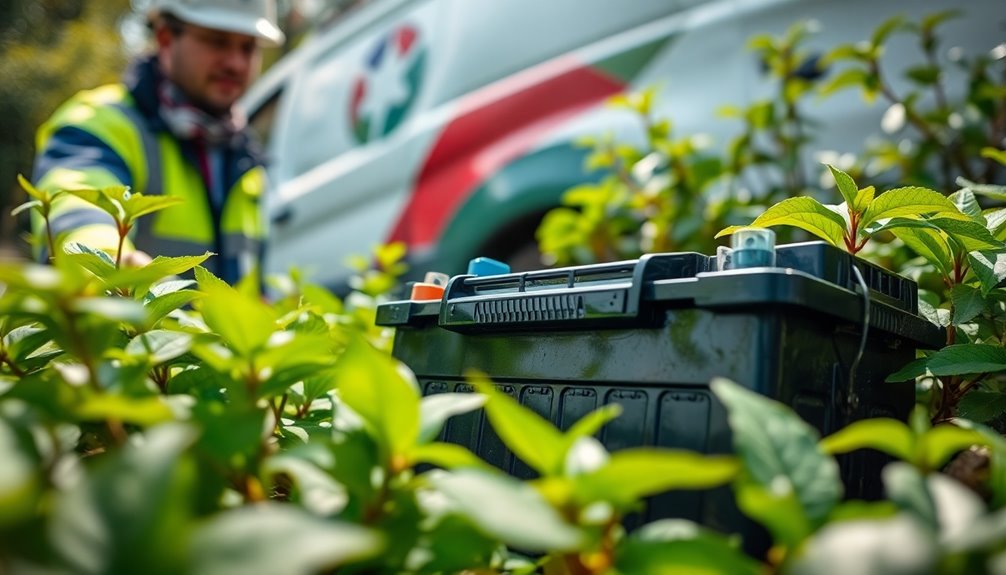
When it comes to disposing of dead car batteries, knowing where to recycle them is vital for protecting the environment. You have several options to guarantee safe disposal through various recycling programs:
- Automotive retailers often accept old batteries when you buy a new one, making it easy for you.
- Local recycling centers provide designated drop-off points for hazardous waste, including car batteries.
- Community organizations frequently organize recycling events specifically aimed at hazardous waste disposal.
These initiatives not only promote responsible disposal but also help prevent environmental harm.
Be sure to check with your state's environmental department for information on local recycling initiatives and programs available in your area.
Regulations and Guidelines

Disposing of dead car batteries isn't just about knowing where to recycle them; it's also important to understand the regulations and guidelines that govern this process. Federal and state regulations classify car batteries as hazardous waste, requiring disposal at authorized facilities. Local laws often prohibit tossing them in regular trash, so check your regional guidelines. Battery manufacturers may also offer take-back programs, ensuring compliance with disposal regulations.
| Regulation Type | Description |
|---|---|
| Federal Regulations | Mandate disposal at authorized facilities |
| State Regulations | Vary by state; check local laws |
| Transportation Rules | Follow guidelines to prevent leaks/spills |
| Manufacturer Programs | Take-back initiatives for safe recycling |
| Penalties | Non-compliance can lead to significant fines |
Benefits of Battery Recycling
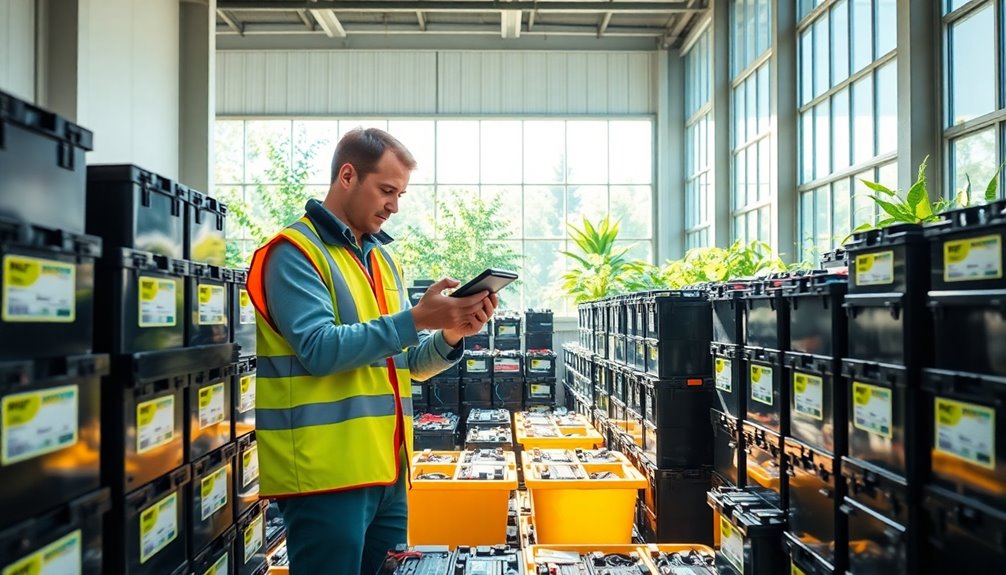
Recycling car batteries offers significant environmental and economic benefits that shouldn't be overlooked. By participating in battery recycling, you help conserve natural resources and promote a sustainable economy.
Here are some key advantages:
- Prevents contamination: Recycling keeps harmful substances out of landfills, protecting soil and groundwater from potential hazards.
- Recovers valuable materials: The process can recover up to 98% of lead and other metals, reducing the need for new mining operations.
- Encourages participation: Many battery recycling programs are free or low-cost, making it easier for you to dispose of batteries responsibly.
As awareness grows, so do the environmental benefits of battery recycling, leading to a healthier planet and a more sustainable future for everyone.
Frequently Asked Questions
What to Do With Old Dead Car Batteries?
When you've got old dead car batteries, don't just toss them in the trash; it's illegal and harmful to the environment.
Instead, take them to authorized disposal sites like automotive retailers or recycling centers. Many local auto parts stores also offer recycling programs.
If you're buying a new battery, check if the dealership will accept your old one.
Participating in local hazardous waste collection days is another safe option.
Who Can Safely Dispose of Dead Car Batteries Aceable?
When it comes to dead car batteries, think of them as ticking time bombs for the environment.
You can safely dispose of them at authorized places like car dealerships and auto parts stores that offer recycling programs. Local recycling centers also accept them, ensuring they're managed properly.
Automotive repair shops often provide drop-off services, and your municipal waste department may have special collection days for hazardous waste, making it easy for you to recycle responsibly.
Who Charges Dead Car Batteries?
If your car battery's dead, you've got several options for charging it.
Automotive service centers can recharge batteries using specialized equipment. Many auto parts stores offer quick charging services, often while you wait.
You can also call a mobile mechanic who'll come to you with the tools needed. Some car dealerships have dedicated battery service departments that can test and charge your battery, ensuring it's ready for peak performance.
Who Can Safely Dispose of Dead Car Batteries in Texas?
If you think tossing a dead car battery in the trash is a good idea, think again—it's like throwing a ticking time bomb into your garbage!
In Texas, you've got several options for safe disposal. Local auto parts stores often offer free recycling when you buy a new battery.
Check with your city for hazardous waste days or visit authorized recycling centers. Car dealerships might even have their own recycling programs available.
Conclusion
In the grand tapestry of environmental stewardship, safe disposal of dead car batteries is a crucial thread. By choosing authorized disposal options, you're not just protecting our planet; you're weaving a brighter future for generations to come. Remember, recycling isn't just a chore; it's a chance to transform waste into wonder. So, take that extra step—your actions can spark a ripple effect, turning discarded batteries into valuable resources and keeping our Earth vibrant and alive.

